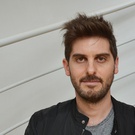- Recherche
Depuis sa création en 1977, l’Ircam a pour mission fondamentale de susciter une interaction féconde entre recherche scientifique, développement technologique et création musicale contemporaine. Cette articulation constitue le principal axe structurant de l’ensemble de ses activités. L’un des enjeux majeurs est de contribuer, par les apports des sciences et techniques, au renouvellement de l’expression musicale.…
- Création
L'Ircam est un centre de recherche internationalement reconnu dont l'activité est consacrée à la création de nouvelles technologies pour la musique et le son. L'institut offre un environnement expérimental unique permettant aux artistes d'enrichir leur expérience sonore via les concepts développés et exprimés grâce aux nouvelles technologies.
- Compositeurs et artistes en studio
- Sébastien Gaxie en studio
- Murcof en studio
- Vimala Pons en studio
- Lucie Antunes en studio
- Deena Abdelwahed en studio
- « I am in blood » pour seize musiciens et électronique live
- « Transfert » pour 10 musiciens et électronique
- L'Annonce faite à Marie
- In Ex Machina
- Jazz Ex Machina
- Improvise cum machina 1/2
- Improvise cum machina 2/2
- Like Sound, Like Flesh
- Entretiens silencieux
- Musiques-Fictions
- Martin Matalon en studio
- Transmission
Au service des missions de recherche et de création de l’Ircam, la transmission cherche à éclairer le sens actuel et en devenir des interactions entre arts, sciences et technologie, mais aussi à partager ses modèles de connaissance, ses savoir-faire et ses innovations vers un public le plus large possible.
- Formations professionnelles
- Stages logiciels 2024.25
- Max, Max for Live
- Composition assistée par ordinateur
- ASAP & Partiels
- Spatialisation sonore
- Design d'expériences audio sur le web
- Intelligence artificielle générative
- Informations pratiques
- Enseignement supérieur
- Cursus de composition et d'informatique musicale
- Master scientifique Atiam
- DNSEP Design sonore
- Parcours musique mixte
- Mastère AIMove
- Découvrir la recherche à l’Ircam
- Innovations
Au cœur d’enjeux sociétaux et économiques croisant culture et technologies de l’information, les recherches accueillies à l’Ircam se présentent dans le paysage international de la recherche comme pôle de référence interdisciplinaire autour des sciences et technologies du son et de la musique et s’exposent en permanence aux nouveaux be…




